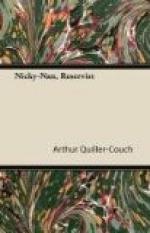“But the noise was terrible. I—I thought for sure it must be the Germans,” came in Mrs Penhaligon’s voice.
“Nothing of the sort. You exaggerate things,” answered Nicky-Nan, commanding his voice. “A rush of soot down the chimney, that’s all. I’ve been expectin’ it for weeks.”
“You mustn’t mind my bein’ easily alarmed—left alone as I be with a family—”
“Not in the least, ma’am.” Nicky-Nan resolutely closed the door and lifted his candle to confirm the miracle.
The candle, which had been guttering, shot up one last flame and died on a flicker of gold.
CHAPTER VII.
“QUID NON MORTALIA PECTORA . . .”
A moment later Nicky-Nan took a step to the door, half-repentant, on an impulse to call Mrs Penhaligon back and bid her fetch a candle. God knows how much of subsequent trouble he might have spared himself by obeying that impulse: for Mrs Penhaligon was a woman honest as the day; and withal had a head on her shoulders, shrewd enough—practised indeed—in steering the clumsy male mind for its good.
But, as we have recorded, Nicky-Nan, having suffered in early life from a woman, had been turned to a distrust of the sex; a general distrust which preoccupied with its shadow the bright exception that, on a second thought, he was ready enough to recognise in Mrs Penhaligon.
This second thought came too late, however. He took one step towards the door, guided by the glimmer, beneath it, of her retreating candle. His hand even fumbled for the latch, and found it. But a sudden shyness seized him and he drew back. He heard her footsteps creaking on the party-stairs: heard the sound of her door softly closed, then the sound of a bolt thrust home in its socket; and turned to face darkness.
His brain worked quite clearly. He guessed well enough what had happened. In his youth he had often listened, without taking note of their talk, while his elders debated how it came about that the Old Doctor had left, beyond some parcels of real estate—cottage property for the most part, the tenants of which were notoriously lax in paying their rents—but a very few personal effects. There were book debts in an inordinate mass; and the heirs found an inordinate difficulty in collecting them, since the inhabitants of Polpier—a hardy sea-faring race—had adopted a cheerful custom of paying for deliverance from one illness when they happened (if ever they did) to contract another: and this custom they extended even to that branch of medical service which by tradition should be rewarded in ready money. ("I always,” explained a Polpier matron, “pays ’en ver one when I engages ‘en ver the next; an’ the laast I’ll never pay ver”— and she never did.) On top of this, Polpier folk argued that doctoring wasn’t, like property, a gift which a man could pass on to his heirs, and most certainly not if they happened




